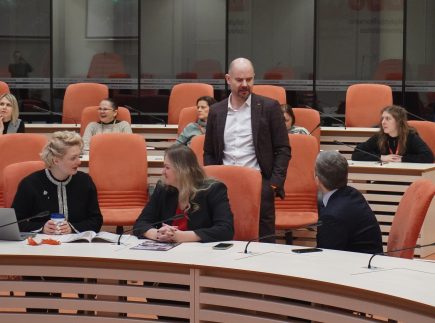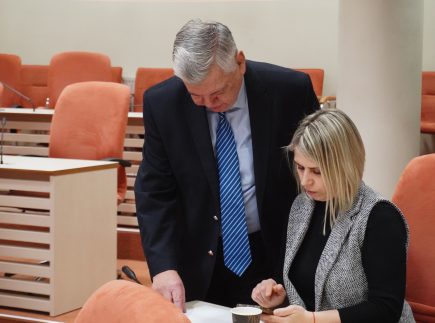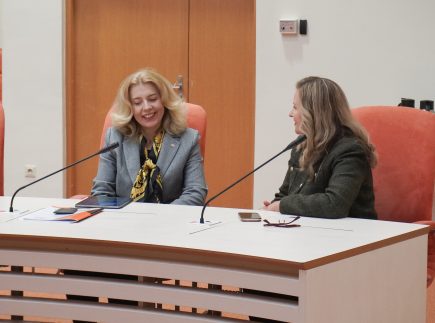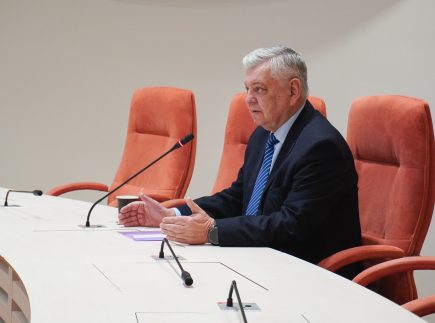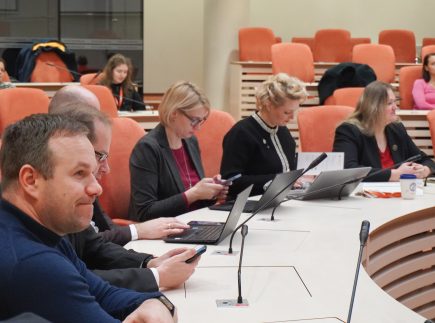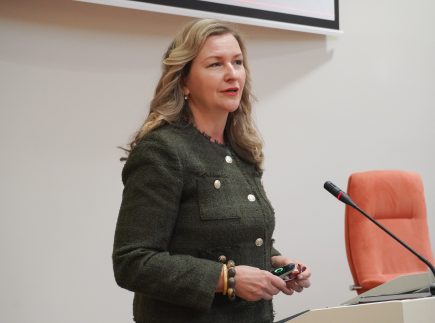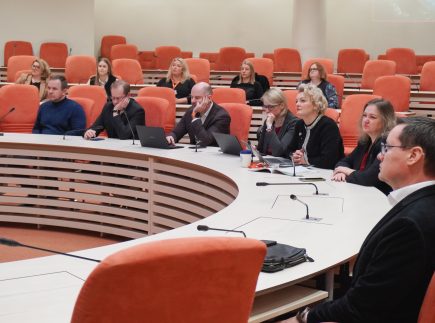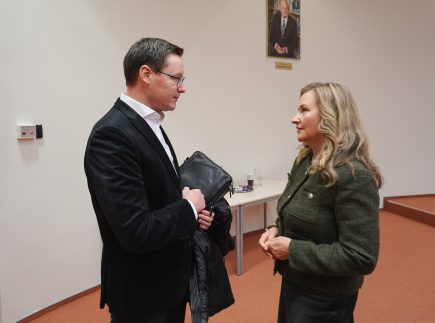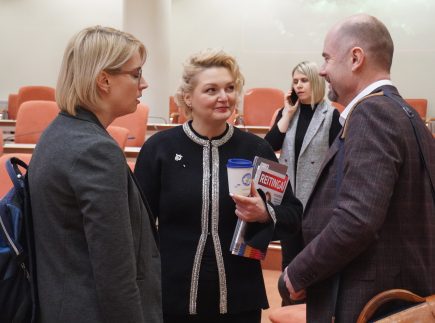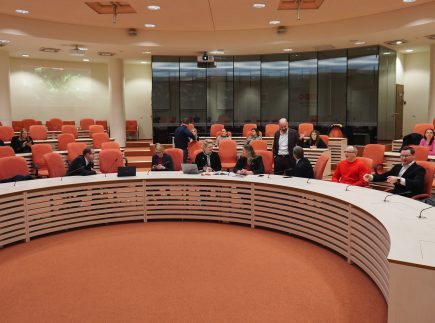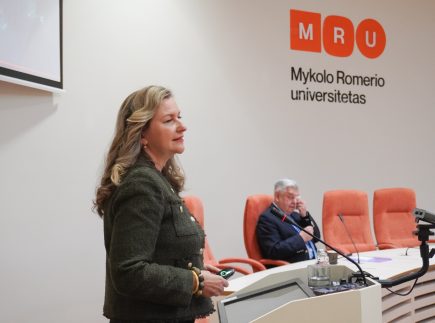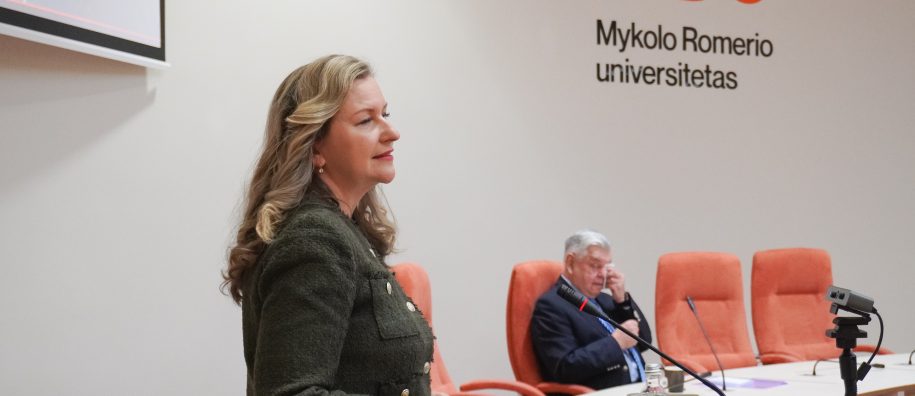
On January 30, Mykolas Romeris University (MRU) presented the 2024 activity report of its Law School.
Presenting the report, the Dean of the Law School, Prof. Dr. Lyra Jakulevičienė, emphasized that in 2024, significant attention was given to restructuring study program offerings, optimizing program content, and updating curricula with new subjects that develop essential competencies for modern legal professionals.
Law programs have been expanded to include technology-related components, such as artificial intelligence and law, as well as new segments on sustainability law and compliance. A new conference course was introduced, allowing students to engage in research, expand their professional networks, and acquire skills not only in university classrooms but also through experiential learning.
The past year also saw an increase in international students enrolling in law programs at both the undergraduate and master's levels. The most popular undergraduate programs remain the classical law program and the English-taught "Law and Global Security." In 2023, the Law School had 179 degree-seeking international students and 199 exchange students from over 15 countries. Compared to 2023, the number of Erasmus+ students grew by 82.6%, while the number of degree-seeking international students remained stable.
In 2024, international students accounted for 11.4% of all Law School students, while their share among new enrollments reached as high as 26%. The employability rate for first-cycle law graduates stood at 92.6%, the highest among law programs in Lithuania. Overall student satisfaction with studies exceeded 80%, with some programs reaching as high as 90%.
Dropout rates have been steadily decreasing compared to previous years, along with a decline in students pausing their studies. In 2024, the private sector provided scholarships for law students: in collaboration with CITCO Mercator, scholarships were awarded for the best master's thesis in corporate law, while the Kazimieras Motieka Foundation awarded a prize for the best dissertation.
The Law School also continued to expand lifelong learning programs. In cooperation with the Anti-Money Laundering Competence Center and the Ministry of Finance, it trained 227 specialists in money laundering and terrorist financing prevention. Specialized training programs were developed in collaboration with the State-Guaranteed Legal Aid Service and the Lithuanian Bar Association for lawyers providing state-guaranteed secondary legal aid to minors and other vulnerable groups, with 110 lawyers trained in this field. Additionally, two one-year training programs were implemented for Ukrainian practitioners in legal technology and mediation.
In the field of research, 2024 saw a significant increase in academic output, with many publications released by internationally recognized publishers. The Law School also worked towards internationalization and talent acquisition, recruiting six postdoctoral researchers and foreign scholars for four Excellence projects. Efforts were made to involve students in research activities, including collaborations with European ERUA Alliance universities and joint international study programs. The prestigious Marie Skłodowska-Curie project was also secured, reinforcing the Law School’s commitment to global academic excellence. The value of commissioned research increased by 30.5%, and project funding grew by 49.37%, demonstrating the School’s active role in knowledge transfer to society.
Efforts were made to enhance doctoral education efficiency and encourage young researchers to pursue academic careers. To strengthen faculty internationalization and retention, the School focused on professional development, mentorship programs, and skill-building systems within the ERUA ecosystem to maintain high research quality.
In 2024, the Law School published significant works with prestigious international publishers and organized major international events, including the annual conferences of European organizations REACT and CERIL, the Global Security and Law Conference, and international conferences on criminal justice, artificial intelligence, private law, and Ukraine, alongside national scientific events on administrative law, law and technology interactions, and personal insolvency processes.
The number of doctoral applications continues to grow, while the number of successfully defended dissertations remains stable. In 2024, eight dissertations were defended at the Law School. A notable achievement is the increased involvement of undergraduate students in research activities, with two new student research projects funded by the Lithuanian Research Council and five student research projects successfully implemented.
The School also made progress in the field of LegalTech, successfully implementing activities related to the UNESCO Chair on AI, Emerging Technologies, and Innovations for Society, led by Prof. Dr. Paulius Pakutinskas.
The impact of the School’s research in 2024 was evident in several areas. In criminal law and procedure, expert opinions contributed to amendments to Lithuania’s Criminal and Criminal Procedure Codes, including decriminalization and stricter or more lenient sanctions. Research on judicial competencies led to proposed amendments to the Courts Act in Albania and Estonia, recommendations for judicial selection and evaluation reforms, and new tools adopted by judicial selection committees. Other projects focused on enhancing youth conflict resolution skills and increasing public participation in decision-making processes.
In project activities, the Law School implemented 34 projects in 2024, with a total MRU share of €4.47 million—nearly 50% more than in 2023. A total of 32 new project proposals were submitted for funding. The School's commissioned research and training services increased by nearly one-third, reaching €568,282 (compared to €435,228 in 2023).
The School actively engaged in legal education initiatives for society, organizing the ninth National Law Knowledge Olympiad for students, participating in the National Constitution Exam Committee, and delivering lectures to school students. Free legal aid was also provided to the public. The Baltic-Ukraine Center, established in 2018 at the initiative of the Law School, continued its activities, including academic collaborations, partnerships with new Ukrainian universities, joint scientific events, and humanitarian initiatives. In 2023, the School also launched the "Lawyers4Ukraine" initiative, uniting the Lithuanian legal community to support Ukraine.
Looking ahead to 2025, the Law School’s priorities will focus on further optimizing study programs, introducing new programs, integrating artificial intelligence tools into legal education, expanding international partnerships and micro-credentials, consolidating research groups within clusters, and strengthening international engagement within the ERUA consortium. Efforts will also be directed toward expanding R&D activities, enhancing researcher competencies in new fields, and consolidating support for young researchers. Additionally, continued support for Ukrainian professionals’ competency development will contribute to Ukraine’s EU accession goals.
